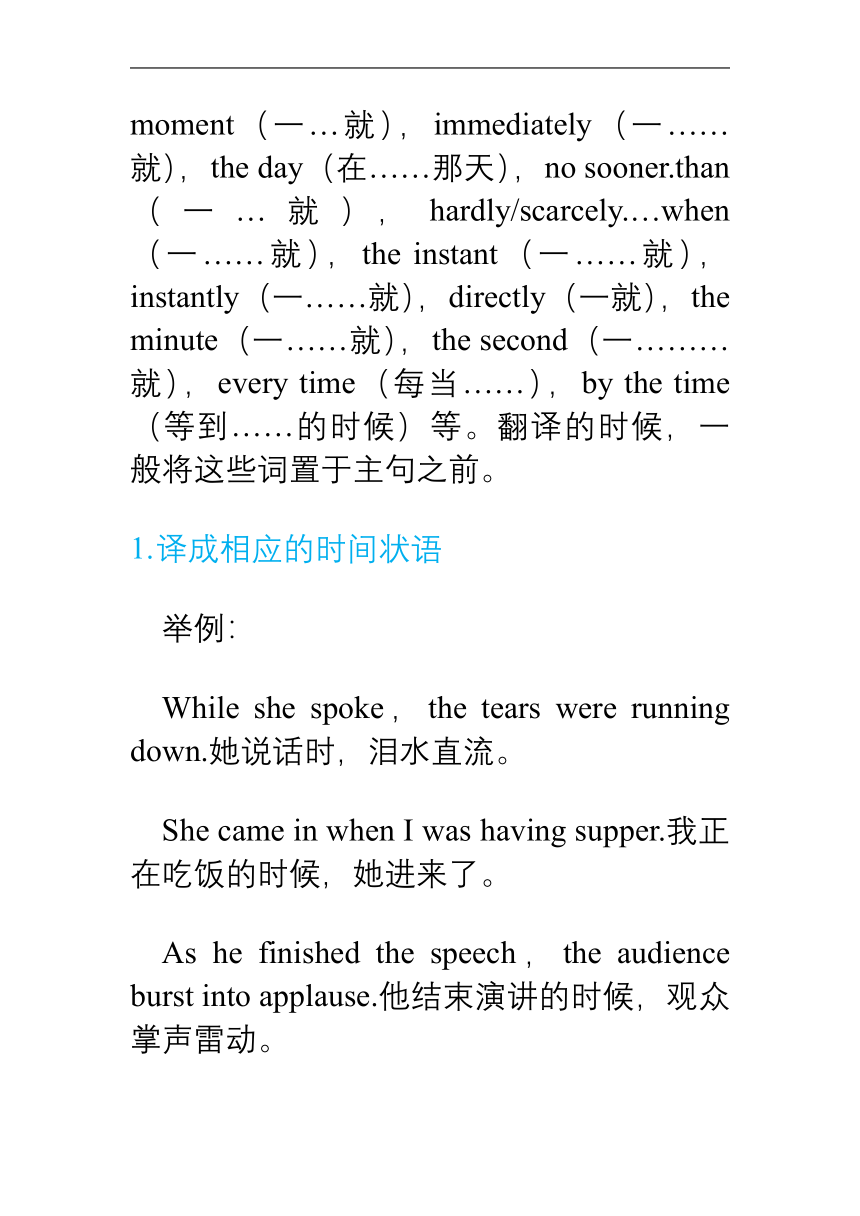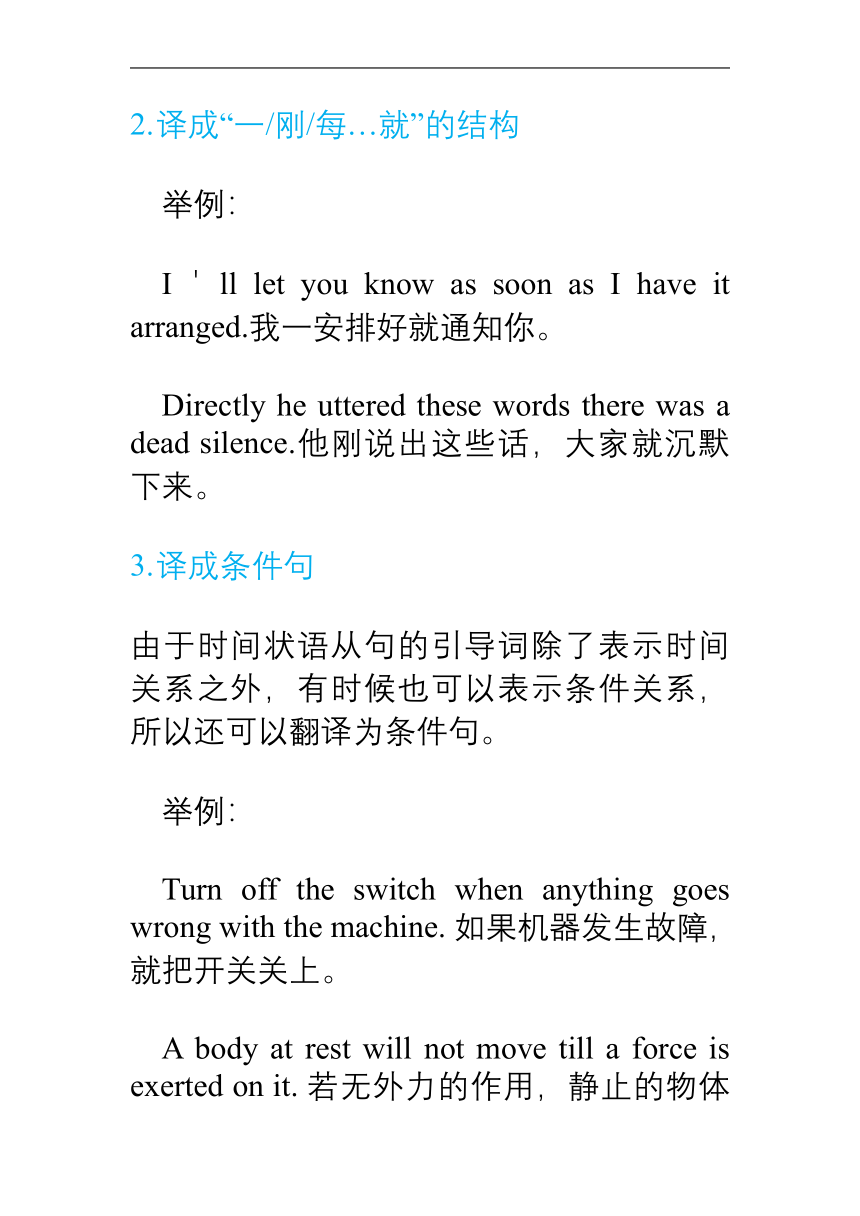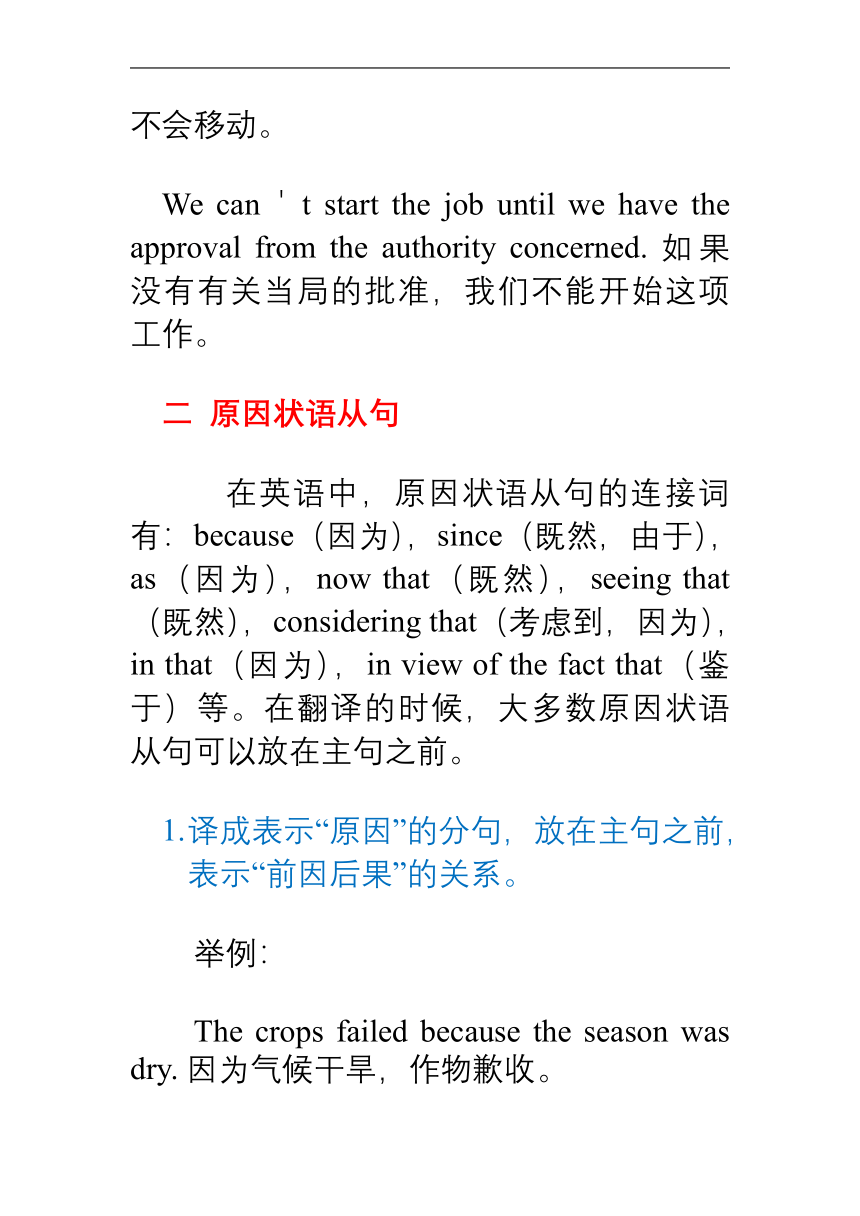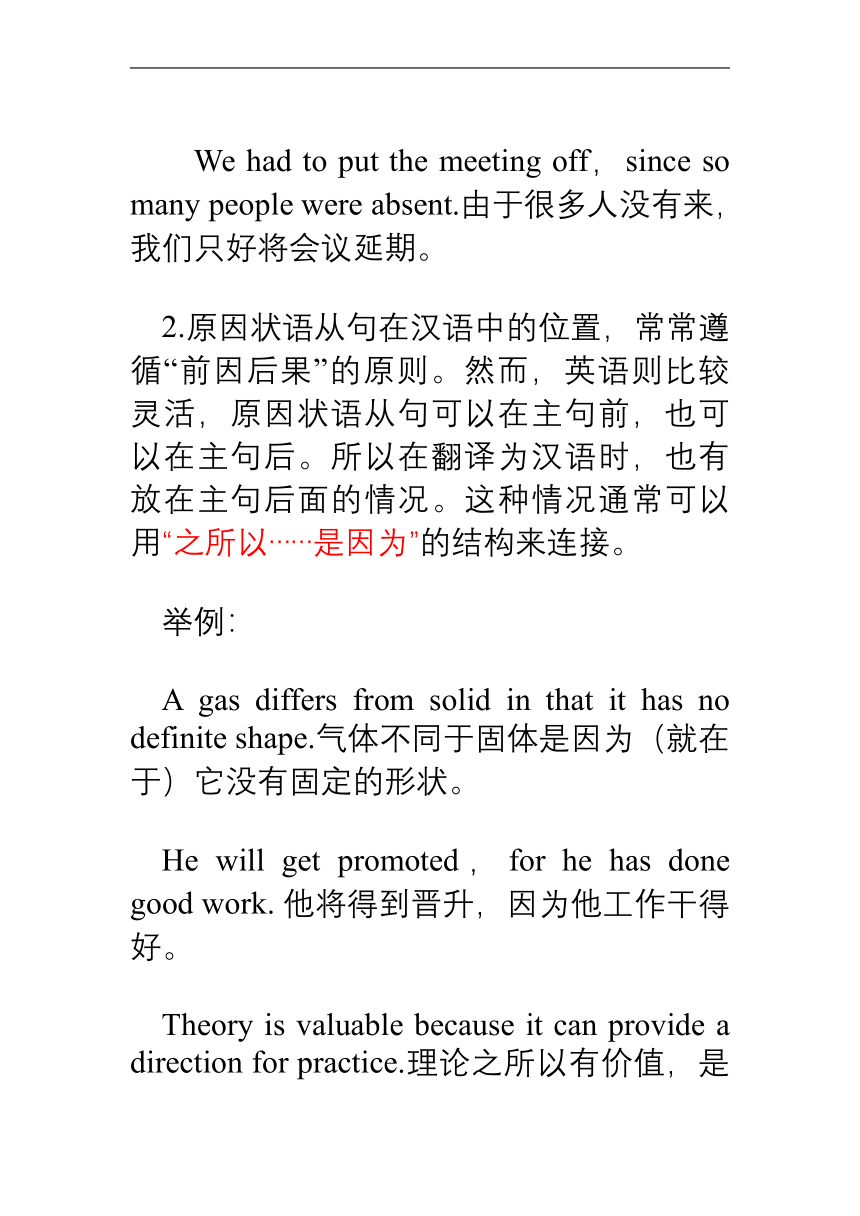2023届高三英语二轮复习状语从句精准翻译讲义-(含答案)
文档属性
| 名称 | 2023届高三英语二轮复习状语从句精准翻译讲义-(含答案) |  | |
| 格式 | docx | ||
| 文件大小 | 19.7KB | ||
| 资源类型 | 教案 | ||
| 版本资源 | 人教版(2019) | ||
| 科目 | 英语 | ||
| 更新时间 | 2022-09-26 12:22:40 | ||
图片预览





文档简介
状语从句
状语从句内容丰富、涉及面广,可以用来表示时间、原因、条件,让步、目的、结果等意义。英语状语从句的翻译一般比较容易处理,通常可以直译。但是这里我们要讨论的是,在汉语译文中,如何将状语从句置于恰当的位置,以及如何将其与主句之间自然地衔接起来,如何按汉语的表达习惯将句子类型进行相应的改变。由于两种语言表达习惯的不同,在状语从句的位置安排方面,存在着明显的差异,所以在翻译的时候也需要根据译入语的表达习惯来灵活处理。
一 时间状语从句
在英语中,时间状语从句的连接词有:when(当……的时候),whenever(每当)、as(当……时),since(自从……),until(直到……),till(直到……),before(在前)、after(在……后),as soon as(一……就),once(一旦……),the moment(一…就),immediately(一……就),the day(在……那天),no sooner.than(一…就),hardly/scarcely.…when(一……就),the instant(一……就),instantly(一……就),directly(一就),the minute(一……就),the second(一………就),every time(每当……),by the time(等到……的时候)等。翻译的时候,一般将这些词置于主句之前。
译成相应的时间状语
举例:
While she spoke,the tears were running down.她说话时,泪水直流。
She came in when I was having supper.我正在吃饭的时候,她进来了。
As he finished the speech,the audience burst into applause.他结束演讲的时候,观众掌声雷动。
译成“一/刚/每…就”的结构
举例:
I'll let you know as soon as I have it arranged.我一安排好就通知你。
Directly he uttered these words there was a dead silence.他刚说出这些话,大家就沉默下来。
译成条件句
由于时间状语从句的引导词除了表示时间关系之外,有时候也可以表示条件关系,所以还可以翻译为条件句。
举例:
Turn off the switch when anything goes wrong with the machine. 如果机器发生故障,就把开关关上。
A body at rest will not move till a force is exerted on it. 若无外力的作用,静止的物体不会移动。
We can't start the job until we have the approval from the authority concerned. 如果没有有关当局的批准,我们不能开始这项工作。
二 原因状语从句
在英语中,原因状语从句的连接词有:because(因为),since(既然,由于),as(因为),now that(既然),seeing that(既然),considering that(考虑到,因为),in that(因为),in view of the fact that(鉴于)等。在翻译的时候,大多数原因状语从句可以放在主句之前。
译成表示“原因”的分句,放在主句之前,表示“前因后果”的关系。
举例:
The crops failed because the season was dry. 因为气候干旱,作物歉收。
We had to put the meeting off,since so many people were absent.由于很多人没有来,我们只好将会议延期。
2.原因状语从句在汉语中的位置,常常遵循“前因后果”的原则。然而,英语则比较灵活,原因状语从句可以在主句前,也可以在主句后。所以在翻译为汉语时,也有放在主句后面的情况。这种情况通常可以用“之所以……是因为”的结构来连接。
举例:
A gas differs from solid in that it has no definite shape.气体不同于固体是因为(就在于)它没有固定的形状。
He will get promoted,for he has done good work. 他将得到晋升,因为他工作干得好。
Theory is valuable because it can provide a direction for practice.理论之所以有价值,是因为它能给实践指出方向。
三 让步状语从句
在英语中,让步状语从句的连接词有:though(虽然),although(虽然),even if(即使),
as(尽管),while(尽管),whatever(无论什么),wherever(无论哪里),whoever(无论
谁),however(无论怎样),no matter(不论,不管),for all that(尽管),granted that(即
使),in spite of the fact that(尽管),despite the fact that(不管)等。翻译的时候,通常把这
些让步状语从句置于主句之前。
举例:
No matter what I say or how I say it,he always thinks I'm wrong.不管我说什么,也不管我怎么说,他总是认为我是错的。
While we cannot see the air,we can feel it.我们虽然看不见空气,但却能感觉到它。
Granted that you don't like the proposal,you shouldn't have rejected it without consulting others.即使不喜欢这项建议,你也不应该没有同别人商量就把它否决了。
四 条件状语从句
在英语中,条件状语从句的连接词有:if(如果),unless(除非,如果不),providing that(假如),so long as(只要),on condition that(条件是),suppose that(假如),in case(如果),only if(只要),if only(但愿/要是……就好了)等。在翻译条件状语从句时,既可以置于主句之前,也可以置于主句之后,有时候,还可以根据上下文省略连接词的翻译。
翻译时,置于主句之前
举例:
It was better in case they were captured. 要是把他们捉到了,那就更好了。
If you tell me about it,then I shall be able to decide.假如你把一切都告诉我,那么我就能够作出决定。
翻译时,置于主句之后,用来补充说明条件
如果”、“要是”、“假如”等都是汉语中用来表示“假设”的常用关联词。汉语中表示“假设”的分句一般前置,但作为补充说明情况的分句则往往后置。
举例:
You can drive tonight if you are ready.你今晚就可以出车,如果你愿意的话。
No doubt I could have earned something if I had really meant to.毫无疑问,我本来是可以赚到一点的,如果我真有那种打算的话。
五 目的状语从句
在英语中,目的状语从句的连接词有:that(为了,以便),so that(为了,以便),lest(以
免),in case(以防,以免),for fear that(以防)、in order that(为了)等。
1.翻译时,一般置于主句之前
举例:
He pushed open the door gently and stole out of the room for fear that he should awake her.为了不惊醒她,他轻轻推开房门,悄悄地溜出了房间。
We should start early so that we might get there before noon.为了正午以前赶到那里,我们应该早点动身。
2.翻译时,还可以置于主句之后,表示“省/免得”、“以免”、“以便”、“使得”、“生怕”等含义。
举例:
He emphasized it again and again,lest she should forget.他反复强调这一点,免得她忘了。
They hid themselves behind the bush for fear that the enemy should find them.他们躲在灌木丛后面,以防被敌人发现。
六 结果状语从句
在英语中,结果状语从句的连接词有:so that,so….that,such….that,to such a degree等,通常可以翻译为“结果;如此…以致于…”,也可以省略不译。
举例:
He made a wrong decision,so that half of his lifetime was wasted.他做了错误的决定,结果浪费了自己半生的时间。
The difference is such that all will perceive it.差别这么大,所有的人都看得出来。(可以将连接词略去不译)
如果主句中含有never,never so,not so,not such等否定词时,but that和but what也可以连接结果状语从句,构成双重否定。翻译的时候,可以译为“没有不……不”。
举例:
She never comes but she borrows. 她不借东西就不来。
She is not so old but that she can read.她并没有老到不能读书。
状语从句内容丰富、涉及面广,可以用来表示时间、原因、条件,让步、目的、结果等意义。英语状语从句的翻译一般比较容易处理,通常可以直译。但是这里我们要讨论的是,在汉语译文中,如何将状语从句置于恰当的位置,以及如何将其与主句之间自然地衔接起来,如何按汉语的表达习惯将句子类型进行相应的改变。由于两种语言表达习惯的不同,在状语从句的位置安排方面,存在着明显的差异,所以在翻译的时候也需要根据译入语的表达习惯来灵活处理。
一 时间状语从句
在英语中,时间状语从句的连接词有:when(当……的时候),whenever(每当)、as(当……时),since(自从……),until(直到……),till(直到……),before(在前)、after(在……后),as soon as(一……就),once(一旦……),the moment(一…就),immediately(一……就),the day(在……那天),no sooner.than(一…就),hardly/scarcely.…when(一……就),the instant(一……就),instantly(一……就),directly(一就),the minute(一……就),the second(一………就),every time(每当……),by the time(等到……的时候)等。翻译的时候,一般将这些词置于主句之前。
译成相应的时间状语
举例:
While she spoke,the tears were running down.她说话时,泪水直流。
She came in when I was having supper.我正在吃饭的时候,她进来了。
As he finished the speech,the audience burst into applause.他结束演讲的时候,观众掌声雷动。
译成“一/刚/每…就”的结构
举例:
I'll let you know as soon as I have it arranged.我一安排好就通知你。
Directly he uttered these words there was a dead silence.他刚说出这些话,大家就沉默下来。
译成条件句
由于时间状语从句的引导词除了表示时间关系之外,有时候也可以表示条件关系,所以还可以翻译为条件句。
举例:
Turn off the switch when anything goes wrong with the machine. 如果机器发生故障,就把开关关上。
A body at rest will not move till a force is exerted on it. 若无外力的作用,静止的物体不会移动。
We can't start the job until we have the approval from the authority concerned. 如果没有有关当局的批准,我们不能开始这项工作。
二 原因状语从句
在英语中,原因状语从句的连接词有:because(因为),since(既然,由于),as(因为),now that(既然),seeing that(既然),considering that(考虑到,因为),in that(因为),in view of the fact that(鉴于)等。在翻译的时候,大多数原因状语从句可以放在主句之前。
译成表示“原因”的分句,放在主句之前,表示“前因后果”的关系。
举例:
The crops failed because the season was dry. 因为气候干旱,作物歉收。
We had to put the meeting off,since so many people were absent.由于很多人没有来,我们只好将会议延期。
2.原因状语从句在汉语中的位置,常常遵循“前因后果”的原则。然而,英语则比较灵活,原因状语从句可以在主句前,也可以在主句后。所以在翻译为汉语时,也有放在主句后面的情况。这种情况通常可以用“之所以……是因为”的结构来连接。
举例:
A gas differs from solid in that it has no definite shape.气体不同于固体是因为(就在于)它没有固定的形状。
He will get promoted,for he has done good work. 他将得到晋升,因为他工作干得好。
Theory is valuable because it can provide a direction for practice.理论之所以有价值,是因为它能给实践指出方向。
三 让步状语从句
在英语中,让步状语从句的连接词有:though(虽然),although(虽然),even if(即使),
as(尽管),while(尽管),whatever(无论什么),wherever(无论哪里),whoever(无论
谁),however(无论怎样),no matter(不论,不管),for all that(尽管),granted that(即
使),in spite of the fact that(尽管),despite the fact that(不管)等。翻译的时候,通常把这
些让步状语从句置于主句之前。
举例:
No matter what I say or how I say it,he always thinks I'm wrong.不管我说什么,也不管我怎么说,他总是认为我是错的。
While we cannot see the air,we can feel it.我们虽然看不见空气,但却能感觉到它。
Granted that you don't like the proposal,you shouldn't have rejected it without consulting others.即使不喜欢这项建议,你也不应该没有同别人商量就把它否决了。
四 条件状语从句
在英语中,条件状语从句的连接词有:if(如果),unless(除非,如果不),providing that(假如),so long as(只要),on condition that(条件是),suppose that(假如),in case(如果),only if(只要),if only(但愿/要是……就好了)等。在翻译条件状语从句时,既可以置于主句之前,也可以置于主句之后,有时候,还可以根据上下文省略连接词的翻译。
翻译时,置于主句之前
举例:
It was better in case they were captured. 要是把他们捉到了,那就更好了。
If you tell me about it,then I shall be able to decide.假如你把一切都告诉我,那么我就能够作出决定。
翻译时,置于主句之后,用来补充说明条件
如果”、“要是”、“假如”等都是汉语中用来表示“假设”的常用关联词。汉语中表示“假设”的分句一般前置,但作为补充说明情况的分句则往往后置。
举例:
You can drive tonight if you are ready.你今晚就可以出车,如果你愿意的话。
No doubt I could have earned something if I had really meant to.毫无疑问,我本来是可以赚到一点的,如果我真有那种打算的话。
五 目的状语从句
在英语中,目的状语从句的连接词有:that(为了,以便),so that(为了,以便),lest(以
免),in case(以防,以免),for fear that(以防)、in order that(为了)等。
1.翻译时,一般置于主句之前
举例:
He pushed open the door gently and stole out of the room for fear that he should awake her.为了不惊醒她,他轻轻推开房门,悄悄地溜出了房间。
We should start early so that we might get there before noon.为了正午以前赶到那里,我们应该早点动身。
2.翻译时,还可以置于主句之后,表示“省/免得”、“以免”、“以便”、“使得”、“生怕”等含义。
举例:
He emphasized it again and again,lest she should forget.他反复强调这一点,免得她忘了。
They hid themselves behind the bush for fear that the enemy should find them.他们躲在灌木丛后面,以防被敌人发现。
六 结果状语从句
在英语中,结果状语从句的连接词有:so that,so….that,such….that,to such a degree等,通常可以翻译为“结果;如此…以致于…”,也可以省略不译。
举例:
He made a wrong decision,so that half of his lifetime was wasted.他做了错误的决定,结果浪费了自己半生的时间。
The difference is such that all will perceive it.差别这么大,所有的人都看得出来。(可以将连接词略去不译)
如果主句中含有never,never so,not so,not such等否定词时,but that和but what也可以连接结果状语从句,构成双重否定。翻译的时候,可以译为“没有不……不”。
举例:
She never comes but she borrows. 她不借东西就不来。
She is not so old but that she can read.她并没有老到不能读书。
